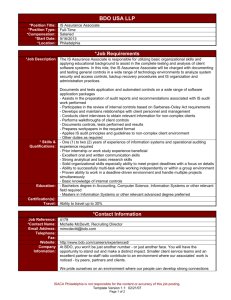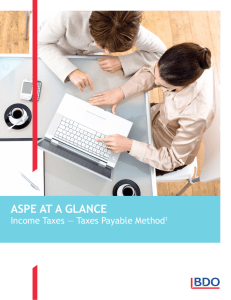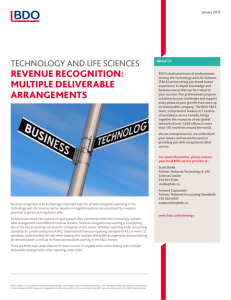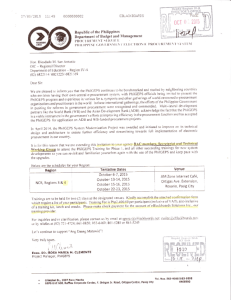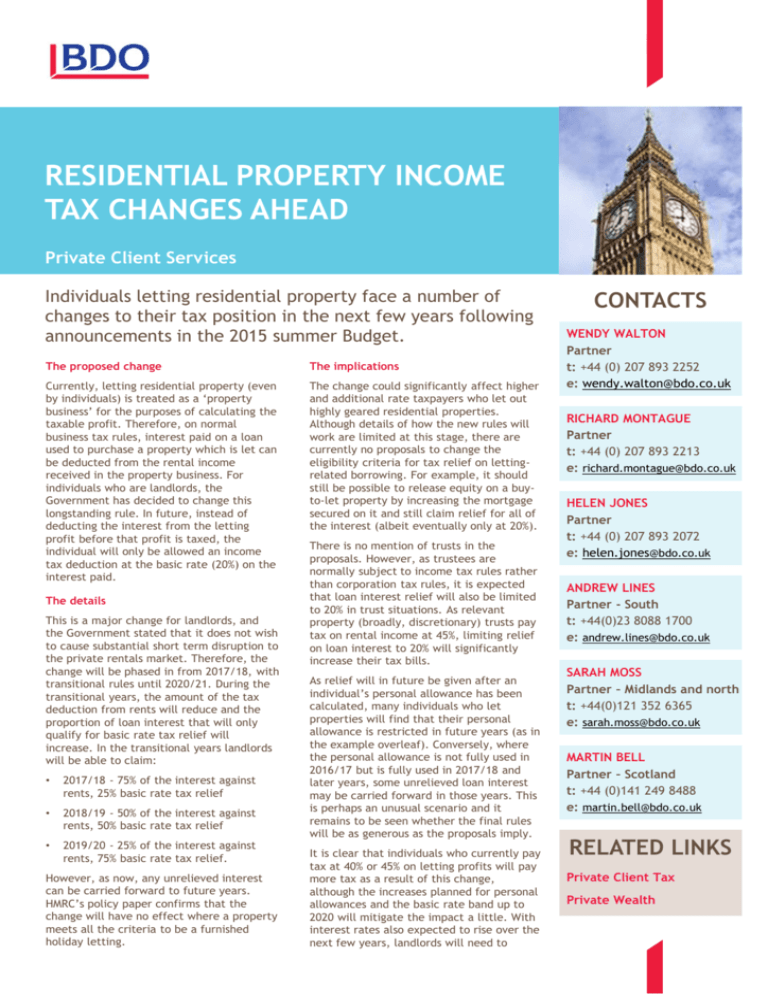
RESIDENTIAL PROPERTY INCOME
TAX CHANGES AHEAD
Private Client Services
Individuals letting residential property face a number of
changes to their tax position in the next few years following
announcements in the 2015 summer Budget.
The proposed change
The implications
Currently, letting residential property (even
by individuals) is treated as a ‘property
business’ for the purposes of calculating the
taxable profit. Therefore, on normal
business tax rules, interest paid on a loan
used to purchase a property which is let can
be deducted from the rental income
received in the property business. For
individuals who are landlords, the
Government has decided to change this
longstanding rule. In future, instead of
deducting the interest from the letting
profit before that profit is taxed, the
individual will only be allowed an income
tax deduction at the basic rate (20%) on the
interest paid.
The change could significantly affect higher
and additional rate taxpayers who let out
highly geared residential properties.
Although details of how the new rules will
work are limited at this stage, there are
currently no proposals to change the
eligibility criteria for tax relief on lettingrelated borrowing. For example, it should
still be possible to release equity on a buyto-let property by increasing the mortgage
secured on it and still claim relief for all of
the interest (albeit eventually only at 20%).
The details
This is a major change for landlords, and
the Government stated that it does not wish
to cause substantial short term disruption to
the private rentals market. Therefore, the
change will be phased in from 2017/18, with
transitional rules until 2020/21. During the
transitional years, the amount of the tax
deduction from rents will reduce and the
proportion of loan interest that will only
qualify for basic rate tax relief will
increase. In the transitional years landlords
will be able to claim:
•
2017/18 - 75% of the interest against
rents, 25% basic rate tax relief
•
2018/19 - 50% of the interest against
rents, 50% basic rate tax relief
•
2019/20 - 25% of the interest against
rents, 75% basic rate tax relief.
However, as now, any unrelieved interest
can be carried forward to future years.
HMRC’s policy paper confirms that the
change will have no effect where a property
meets all the criteria to be a furnished
holiday letting.
There is no mention of trusts in the
proposals. However, as trustees are
normally subject to income tax rules rather
than corporation tax rules, it is expected
that loan interest relief will also be limited
to 20% in trust situations. As relevant
property (broadly, discretionary) trusts pay
tax on rental income at 45%, limiting relief
on loan interest to 20% will significantly
increase their tax bills.
As relief will in future be given after an
individual’s personal allowance has been
calculated, many individuals who let
properties will find that their personal
allowance is restricted in future years (as in
the example overleaf). Conversely, where
the personal allowance is not fully used in
2016/17 but is fully used in 2017/18 and
later years, some unrelieved loan interest
may be carried forward in those years. This
is perhaps an unusual scenario and it
remains to be seen whether the final rules
will be as generous as the proposals imply.
It is clear that individuals who currently pay
tax at 40% or 45% on letting profits will pay
more tax as a result of this change,
although the increases planned for personal
allowances and the basic rate band up to
2020 will mitigate the impact a little. With
interest rates also expected to rise over the
next few years, landlords will need to
CONTACTS
WENDY WALTON
Partner
t: +44 (0) 207 893 2252
e: wendy.walton@bdo.co.uk
RICHARD MONTAGUE
Partner
t: +44 (0) 207 893 2213
e: richard.montague@bdo.co.uk
HELEN JONES
Partner
t: +44 (0) 207 893 2072
e: helen.jones@bdo.co.uk
ANDREW LINES
Partner - South
t: +44(0)23 8088 1700
e: andrew.lines@bdo.co.uk
SARAH MOSS
Partner – Midlands and north
t: +44(0)121 352 6365
e: sarah.moss@bdo.co.uk
MARTIN BELL
Partner – Scotland
t: +44 (0)141 249 8488
e: martin.bell@bdo.co.uk
RELATED LINKS
Private Client Tax
Private Wealth
consider these issues carefully when setting rent levels in
future.
onwards, landlords would only be able to claim expenses
actually incurred during the tax year, excluding any element
of replacement expenditure that represents an improvement.
Ownership through a company
This change will have no direct impact on those who own and
let residential properties through a company: companies will
continue to deduct loan interest as a business expense and get
effective relief at up to 20% (although this will fall in future as
the rate of corporation tax falls). However, by 2020, this
change will remove the interest relief disincentive to holding
buy-to-let properties through a company. Similarly, the ability
to take income flexibly in the form of dividends will be more
attractive to landlords who might otherwise lose their
personal allowance. Of course, the effective rate of tax on
dividend income will change from 6 April 2016. Those taking
low levels of dividends may suffer a lower effective rate
because of the new £5,000 allowance, but those taking higher
dividends may pay more as the rate of tax on dividends rises.
As there are many other issues to consider, deciding on the
most efficient way to hold buy-to-let properties is not
straightforward – the best option will depend on individual
circumstances and long term objectives. Incorporation of an
existing property letting business may not be practicable in
many cases, including where this would result in a large stamp
duty land tax liability.
Wear and tear allowance
The Government is consulting on a proposal to remove the
established system of allowing a fixed annual deduction for
wear and tear on soft furnishings and moveable furniture used
in a furnished letting business (10% of the rents less costs
normally paid by the tenant) from April 2016. For 2016/17
For furnished lettings, this change may benefit landlords
letting high value properties where their annual costs for
replacement of soft furnishings and moveable furniture are
high. Conversely, landlords at the lower end of the market
will need to carefully consider the impact that this will have
on their rental profit in future years. Where possible, delaying
replacement of soft furnishings until after 6 April 2016 is
likely to be beneficial, as the wear and tear allowance will be
available for 2015/16 regardless of the amount of actual
expenses, but a full deduction for replacement costs will be
available in 2016/17.
The change could also benefit landlords of partly furnished
properties, as the policy paper states that the new relief
would apply to all landlords of residential dwelling houses, no
matter what the level of furnishing.
Rent a room relief
The annual amount that landlords can receive from letting a
room in their own home before tax becomes payable is to be
increased from £4,250 to £7,500 (£144 per week) from April
2016 onwards. There are no proposals to change the other
rules for the relief, so the new £7,500 limit will be available
as an exemption or, where rents are higher, as a fixed
deduction from rents.
For help and advice on residential property tax
issues please contact our Private Client team
overleaf.
Example - Mrs K
2016/17
Salary
Rents
Loan Interest paid
Interest deduction
Profit
Taxable income
2017/18
95,000
12,000
10,000
(10,000)
Personal allowance*
95,000
12,000
10,000
(7,500)
2,000
97,000
2020/21
95,000
12,000
10,000
(0)
4,500
99,500
11,000
12,000
107,000
12500
11,375
Reduction of PA (£7,000/2 = £3,500)
Taxable income
Tax*
£32,000 @ 20% + £54,000 @ 40%
£33,375 @ 20% + £54,750 @ 40%
£37,500 @ 20% + £60,500 @ 40%
Basic rate relief on loan interest
£2,500 @ 20%
£10,000 @ 20%
Total tax
86,000
28,000
88,125
9,000
98,000
28,575
31,700
(500)
£28,000
£28,075
(2,000)
£29,700
* Calculations assume that personal allowance and basic rate band increase
evenly to £12,500 and £37,500 respectively by 2020 as planned.
This publication has been carefully prepared, but it has been written in general terms and should be seen as broad guidance only. The publication cannot be relied upon to cover specific
situations and you should not act, or refrain from acting, upon the information contained therein without obtaining specific professional advice. Please contact BDO LLP to discuss these matters
in the context of your particular circumstances. BDO LLP, its partners, employees and agents do not accept or assume any liability or duty of care for any loss arising from any action taken or not
taken by anyone in reliance on the information in this publication or for any decision based on it. BDO LLP, a UK limited liability partnership registered in England and Wales under number
OC305127, is a member of BDO International Limited, a UK company limited by guarantee, and forms part of the international BDO network of independent member firms. A list of members'
names is open to inspection at our registered office, 55 Baker Street, London W1U 7EU. BDO LLP is authorised and regulated by the Financial Conduct Authority to conduct investment business.
BDO is the brand name of the BDO network and for each of the BDO Member Firms. BDO Northern Ireland, a partnership formed in and under the laws of Northern Ireland, is licensed to operate
within the international BDO network of independent member firms. BDO LLP is the Data Controller for any personal data that it holds about you. We will not share your details with third parties
other than those agents and service providers used to meet your requirements. To correct your personal details or if you do not wish us to provide you with information that we believe may be
of interest to you, please telephone (Great Britain - 0870 567 5678 or Belfast - 028 9043 9009).
Copyright © September 2015 BDO LLP. All rights reserved.
www.bdo.co.uk
TT15/75

